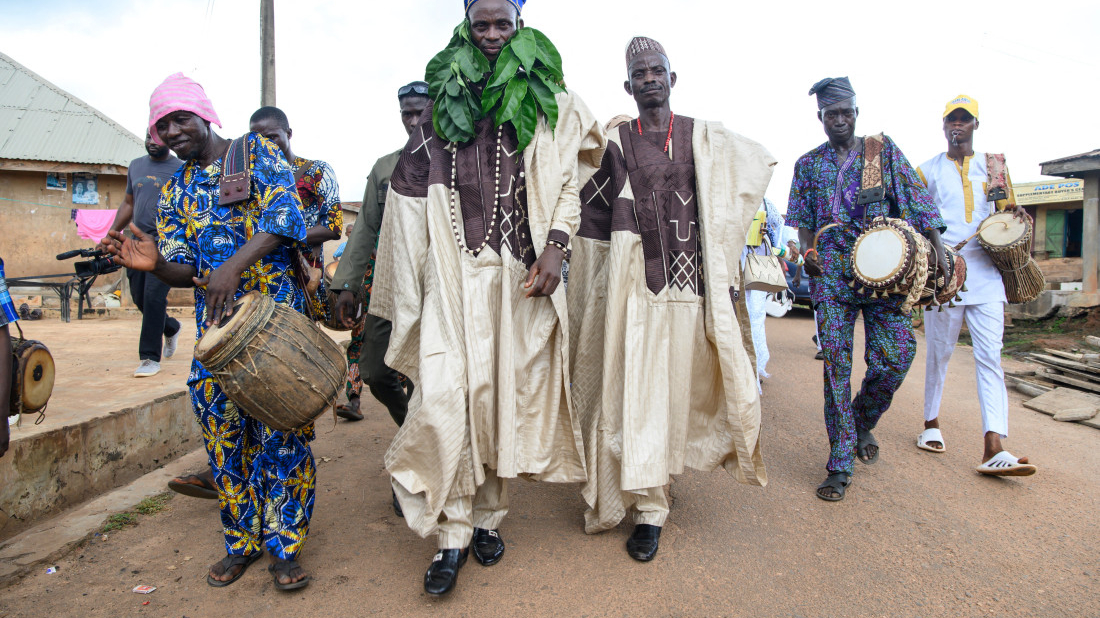U.S. deploys carrier near Israel; countries urge citizens to leave region
The United States has deployed the aircraft carrier USS Gerald R. Ford near Israel as part of a growing military build-up amid tensions with Iran, whi...

In a sea of duplicate facial features, the sleepy town of Igbo-Ora in Nigeria's southwest Oyo state came alive over the weekend with laughter, music, and celebration at the annual Twins Festival.
The festival featured a procession of twins of various ages, parading in pairs, taking photos, dressed in matching clothes and accompanied by drummers and dancers.
The five-day event showcased the unique bond between twins.
Opeyemi Daniel, who grew up as the only single birth among five sets of twins in her family, celebrated at the festival with her own twin girls.
"I had a special interest for twins when we were young. I am the only one that is not a twin among my mother's children. My mother had twins five times. I used to be happy when I saw them. So I hoped that when I also have twins I will endow them with the same clothes and same shoes, so I wanted twins and I have them now," she told Reuters.
Twins are common in the Yoruba ethnic group that dominates southwest Nigeria.
A 1970 study by a British gynecologist found that around 50 sets of twins were born out of every 1,000 births in the southwest - one of the highest rates of twin births in the world.
Even among Yoruba people, Igbo-Ora is considered exceptional, with at least one twin birth in every family.
Kehinde Oladele-Oguntoye, founder of the World Twins festival, said: "For this event we are not projecting a particular amount of twins, but for the past events, I can remember like 3 or 4 years ago, we recorded 2,034 sets of twins in this same field here."
The names Kehinde and Taiwo, given to all Yoruba twins, are commonplace in Igbo-Ora, reflecting the town's high twin birth rate.
In Yoruba culture, Kehinde, the second-born twin, is considered the elder, based on a century-old myth.
Igbo-Ora's king, Jimoh Olajide-Titilayo, said: "All the households here, each compound have twins in their midst, and this is something unique that if you call 'Kehinde' you will see so many 'Kehindes' looking in your direction. The same thing happens to Taiwo."
Locals believe the high rate of twin births is linked to okra leaf and amala, a local dish made from yam and cassava flour.
However, doctor Gafar Amoo said research suggests genetic factors are more likely responsible.
"There has been a lot of efforts in the past by scientists, by medical researchers to unravel the mysteries behind the multiple pregnancies in Igbo-Ora, and one of the major factors that was identified is the issue of genetic factors," he said.
This year's festival saw fewer twins in attendance compared to previous years.
Organizers aim to set a Guinness World Record for the largest twin gathering and secure UNESCO recognition as a cultural heritage event.
The death toll from heavy rains and flooding in Brazil’s Minas Gerais state has risen to 46, authorities said, with 21 people still reported missing. The storms triggered landslides and widespread flooding, displacing thousands across Juiz de Fora and Uba.
The situation in Cuba was heating up and called for restraint following a deadly incident involving a Florida-registered speedboat off the coast of the Caribbean island, the Kremlin said on Thursday (26 February).
Syria’s economy is showing clear signs of recovery, with economic activity accelerating in recent months, the International Monetary Fund (IMF) said on Wednesday.
The United States has deployed the aircraft carrier USS Gerald R. Ford near Israel as part of a growing military build-up amid tensions with Iran, while governments around the world urge their citizens to leave parts of the region.
Venezuela’s Attorney General Tarek William Saab and Ombudsman Alfredo Ruiz tendered their resignations to the National Assembly on Wednesday. Neither official has publicly provided reasons for stepping down.
Hindu devotees in the northern town of Barsana in Uttar Pradesh celebrated ‘Laddoo Holi’ on Tuesday (24 February), a traditional pre-Holi ritual honouring the Hindu deity Krishna.
Robert Carradine, best known for his roles in The Long Riders, Revenge of the Nerds and the television series Lizzie McGuire, has died at the age of 71 following a years-long battle with mental illness.
A seven-month-old Japanese macaque has drawn international attention after forming an unusual bond with a stuffed orangutan toy after being rejected by its mother.
Eric Dane, the actor best known for his roles in 'Grey’s Anatomy' and 'Euphoria', died on Thursday, at the age of 53 after a battle with amyotrophic lateral sclerosis (ALS). His family confirmed his death after what they described as a “courageous battle” with ALS.
Robert Duvall, the Oscar-winning actor renowned for his steely intensity and commanding performances in films including The Godfather and Apocalypse Now, has died at the age of 95.
You can download the AnewZ application from Play Store and the App Store.

What is your opinion on this topic?
Leave the first comment